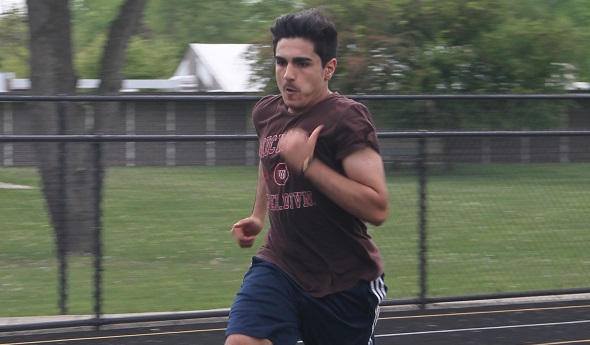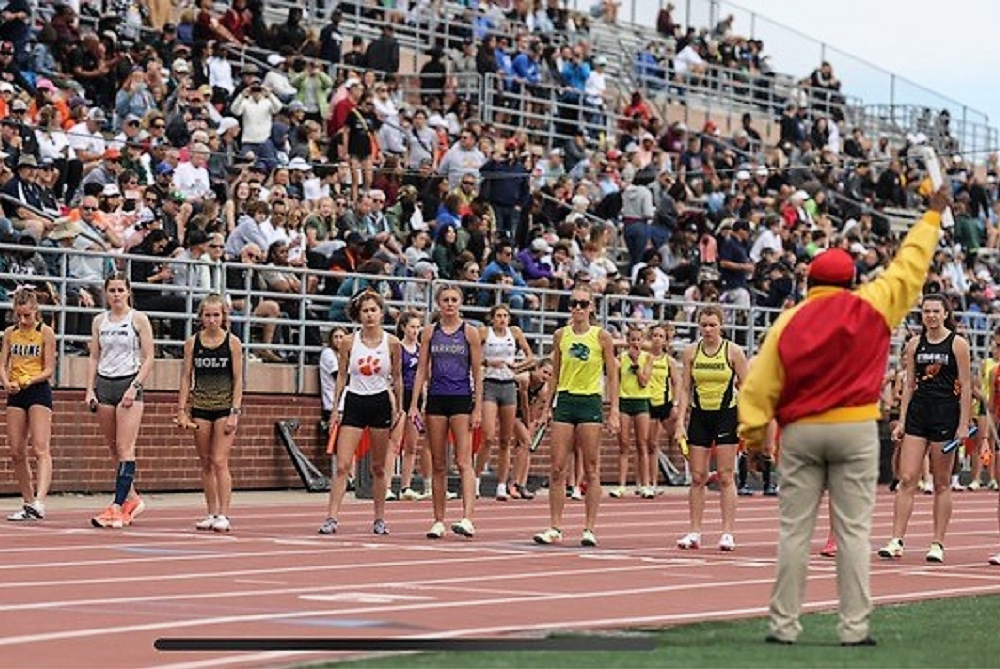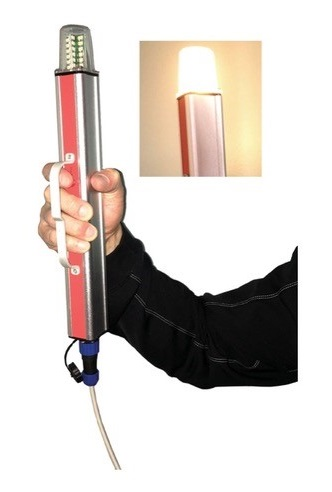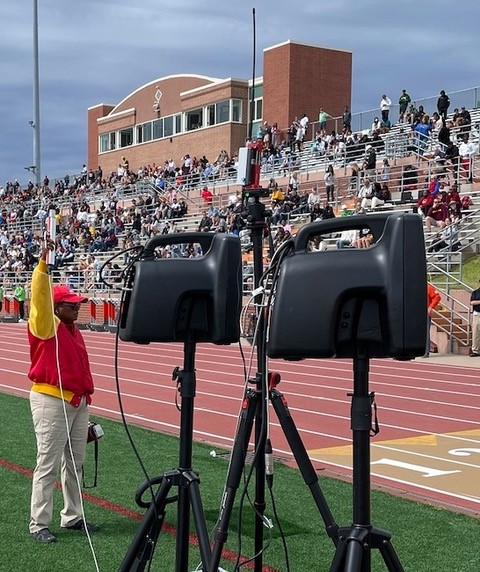
Parchment Enjoys Exchange of Experiences
By
Pam Shebest
Special for MHSAA.com
May 23, 2016
PARCHMENT — Pecan pie and snow are just two surprises Khaled Bukhamseen found as an exchange student at Parchment High School.
 “Pies are not as famous back home,” he said. “I actually learned how to make them so I can do that back home.
“Pies are not as famous back home,” he said. “I actually learned how to make them so I can do that back home.
“My favorite is pecan pie. Oh my gosh.”
The Dammam, Saudi Arabia, native, who played soccer in the fall and competed on the track & field team this spring, had never seen snow.
“It was pretty sweet the first couple times, but then I got sick of it,” he said, grinning. “It was like, ‘OK, we had fun, you can leave now.’
“I had to buy actual winter clothes.”
Another surprise was organized sports.
When Bukhamseen decided to try out for the Parchment track team, he figured he would just drop in for practice whenever he felt like exercising.
He got a reality check when he realized what a commitment he had to make.
“They told me about track and the activities you can do, like races,” he said. “I thought I would give it a try. I was pretty sure I would like it because I’m fast.
“I like the competition. Sometimes you do so good and you get first place and you feel like you’re the best on the team. That’s the good part about it.”
Parchment’s track season is over for all but the six individuals who qualified last week for the MHSAA Lower Peninsula Division 3 Finals. The exchange student is not one of them – but will finish his year in the United States with an experience valuable not only to him but his teammates and coaches as well.
The only high school sports at Bukhamseen’s school in Dammam are in physical education classes.
“I played soccer, but it was just a PE class where they try to vary the sports,” he said. “That was pretty much the only thing I did, and it was like once a week for 45 minutes.”
Once Bukhamseen showed interest in joining the track team, coach Matt Hodgson evaluated him for his strengths and weaknesses along with what the team needed.
“Khaled appeared to us to be stronger in the sprints than long distance,” Hodgson said. “I don’t think running five miles a day out on the road is something that interested him.”
 The coach also made sure the sprinter knew what was expected.
The coach also made sure the sprinter knew what was expected.
“Organized athletics (in Saudi Arabia) are not like they are in America,” Hodgson said. “In fact, one day we talked about it and he said when he first came out for track he thought it was something you kinda showed up for and practiced when you wanted to and made a meet when you wanted to.
“He said, ‘You don’t allow that, coach, do you?’ I said no; when you commit, you commit and you’re expected to be here every day.”
Bukhamseen competed in the 100- and 200-meter dashes, 400 relay and long jump.
Hodgson said Bukhamseen brought a lot of energy to the team.
“We always expect something quite hilarious to come out of his mouth daily,” the coach said. “He’s a good teammate who has really bonded with a lot of the kids on the team.
“Because he’s not used to this organization of athletics, he’s oftentimes running around saying ‘Coach, when’s my event, what am I doing?’ We always expect him to be a little frazzled at times at meets, and it’s quite comical.”
Bukhamseen wasn’t the only one benefiting from the exchange program. Members of the track team did, too.
“He’s given us a different perspective on the world, and he’s told us about the people of Saudi Arabia,” said Donavan Hodgson, the coach’s son, who runs anchor on the 400 relay team. He’s a really funny guy and a really cool guy, too.”
Students also are getting a lesson in culture.
“I think in the United States, especially, there’s a really bad rap on Muslims and people from those areas,” Donavan Hodgson said. “Khaled’s the exact opposite of what (some may) think. He’s the most passive-aggressive guy ever. He’s a really good guy.”
Bukhamseen started the school year with the Kellay Fall and Bill Evans family and for the last few months has lived with the Kira and Franz Griggs family.
 Kira Griggs was an exchange student in Paraguay when she was 15 years old and sees hosting a student as paying it forward.
Kira Griggs was an exchange student in Paraguay when she was 15 years old and sees hosting a student as paying it forward.
“They really integrate into your family much more than you think,” she said. “You adapt to each other; he’s just another family member.
“He’s a typical teenager; always on his phone, out with friends. His English is so perfect. He’s a great kid, a great student. He has a lot of friends.”
Bukhamseen said it is not unusual for Saudis to study in the United States, especially for college, and his two brothers are currently studying in Seattle.
Although his native language is Arabic, Bukhamseen speaks excellent English.
“In Saudi Arabia it’s mandatory to learn English in first grade,” he said. “My dad has kept it up with me. My dad went to Houston to college.”
Bukhamseen takes most of his class notes in English, but, “If I have a note to the side, I’d write it in Arabic quick, especially a vocab test every Friday,” he said. “I would write the equivalent of the word in Arabic so I wouldn’t forget it.”
Track wasn’t his only sport at Parchment.
When he first came to the United States in August, he integrated himself by joining the soccer team.
That also was an awakening.
“Having a team and a coach and practices, it’s way different than having it just once a week,” he said.
“I had to work out a little extra. They started earlier than me because I came a little late (August) to start the season.”
Soccer coach Matt Streitel has had exchange students on his teams before and said that each boy brings something different to the team.
“It’s cool,” he said. “You get that culture you might not get from other students.
 “Khaled had a little bit of skill and was excited to be there.”
“Khaled had a little bit of skill and was excited to be there.”
Bukhamseen had to go through a rigorous workshop before being accepted into the AFS Intercultural Program.
“Khaled has a great sense of humor,” said David Person, co-coordinator for the West Michigan chapter. “He had to go to Riyadh for orientation and he said it was from 7 to 8, so he thought he’d be in and out in an hour but it was a 13-hour orientation.
“What he had to go through to get here was very stringent. He’s the cream of the crop.”
Bukhamseen is also part of the YES Program, a government-sponsored youth exchange and study, Person said.
“He’s here under U.S. government scholarship,” he said. “They go out and choose the best students ever, the future leaders.
“The YES Program works with programs that have large Muslim populations. He’s one of three YES students in this (southwest Michigan) area.”
The others are at Kalamazoo Central and Battle Creek Central.
 Pam Shebest served as a sportswriter at the Kalamazoo Gazette from 1985-2009 after 11 years part-time with the Gazette while teaching French and English at White Pigeon High School. She can be reached at [email protected] with story ideas for Calhoun, Kalamazoo and Van Buren counties.
Pam Shebest served as a sportswriter at the Kalamazoo Gazette from 1985-2009 after 11 years part-time with the Gazette while teaching French and English at White Pigeon High School. She can be reached at [email protected] with story ideas for Calhoun, Kalamazoo and Van Buren counties.
PHOTOS: (Top) Khaled Bukhamseen rounds a turn during a recent Parchment track practice. (Middle top) Bukhamseen, Parchment coach Matt Hodgson, teammate Donavan Hodgson. (Middle below) Bukhamseen trains in the long jump. (Below) David Person, Kira Griggs. (Photos by Pam Shebest.)

Track Gaining Speed Toward Future with Electronic Starting Devices
By
Steve Vedder
Special for MHSAA.com
May 23, 2023
Aubrey Greenfield thinks it might be the perfect time to reevaluate 130 years of tradition.
For a number of reasons, from technical to personal, the Oxford senior sprinter believes it makes sense for the crack of a starting pistol to be eliminated from high school track meets.
Because track meets would benefit in various ways from lowering costs to easier setup at meets to the human factor of competitors not having to flinch at the crack of a pistol shot, Greenfield believes the sport has a chance to embrace new technology – electronic starting devices (ESD).
In essence, an ESD replaces the starting pistol with a light flash, tone sound or both to begin a race.
"High school sports should put the athlete first," Greenfield said. "We should promote sports, and eliminating starting pistols promotes health in terms of PTSD or trauma for athletes and spectators and that would be good. I would like to think people would say that's a good idea."
In fact, Greenfield would go as far as to say if there was not an implementation of electronic starting devices, many of her teammates would have considered giving up the sport.
"If it's something that helps us compete safely, we're all for it," she said.
Greenfield's opinion apparently is spreading. Michigan High School Athletic Association senior assistant director Cody Inglis said the use of ESD makes it both affordable for meet starters and sensible for athletes and fans to rethink the use of starting pistols. While the MHSAA is not mandating electronic starting devices, it does promote the use of what Inglis calls "emerging technology." He notes that ESD are becoming the norm for organizations such as USA Track & Field, the NCAA and an increasing number of high schools.
 "I think we have to embrace new technology, and we think this will be something that takes hold," Inglis said.
"I think we have to embrace new technology, and we think this will be something that takes hold," Inglis said.
A key part of embracing ESD is the human element. The tragic Oxford High School shooting Nov. 30, 2021, that took the lives of four students while injuring seven others should not be relived even for a fleeting instance at a high school sporting event. Oxford athletic director Tony DeMare said the school began using ESD at every meet, including the MHSAA Lower Peninsula Division 1 Finals last June. He said that decision was embraced by virtually all schools Oxford encountered.
"We were very convinced that the alternative (of ESD) would promote a healthy attitude," DeMare said. "We were overwhelmed with the positive response. If a school was on the fence about it or might not be for it, I think we've started to see the tide turn in favor of people willing to listen and learn about electronic starting devices."
Inglis said the MHSAA is acutely aware of what the crack of a starting pistol can mean to athletes and fans.
"It's unimaginable what Oxford went through, and this is a small way we can help," he said. "We look at a (starting pistol) and think, ‘Could we do something else?’ It's a way of helping to solve a problem."
Over the last several years, the MHSAA has embraced finding an alternative to starting pistols. Inglis noted the discussion started with the cost and diminishing availability of 32-caliber ammunition that meet starters use. A box of ammunition, if it can be found, is around $75 a box.
In addition to cost, there is potential damage from excessive exposure to 150-plus decibels of sound generated by the traditional 32-caliber blanks. Medical studies show damage to ears caused by decibel levels above 120 dB.
The tragedy at Oxford accelerated the conversation.
Inglis said the cost of ESD can be likened to a school sinking money into artificial surfaces at football fields. Yes, there is a great cost at first, but over time money is ultimately saved. An ESD system itself ranges between $200 and $500. Speakers also may need to be purchased, but with ESD starting events like the 800 and 1,600-meter relays positioned near the outside lanes 8, 7, 6 and 5 would result in improved hearing by athletes at the start of a race.
There is one challenge with ESD that track administrators are working to overcome – lighting conditions that lessen the ability to see the ESD’s LED light or strobe when the button is pressed by a starter to begin a race. But that vision difficulty resulting from clear blue skies and backgrounds of setting suns can be substantially improved by incorporating a black background with an ESD – something as simple as a starter holding up black cardboard behind the lighting mechanism at the start of an event.
Inglis said when all factors are considered, the use of ESD makes sense.
 "With the climate we live in nowadays, no lookalike guns is good," he said. "We're not mandating this. But people are saying this is affordable."
"With the climate we live in nowadays, no lookalike guns is good," he said. "We're not mandating this. But people are saying this is affordable."
While switching to ESD would break 130 years of tradition, the timing could be a step forward, said Jeff Hollobaugh, co-author of the book "The Fleet Feet of Spring: Michigan's High School State Championships in Track & Field." He said while no definitive answer is possible, it's likely starting pistols were used at the inaugural state meet at the Jackson Fairgounds in 1895. The meet, which included events like tossing a 16-pound shot put, bike races and a 100-meter sprint, was sponsored by the Michigan Interscholastic Athletic Association (a predecessor to the MHSAA) and comprised mostly of the state's larger schools.
Hollobaugh's sentiments echo what many involved in today's high school track & field believe in terms of making a transition from starting pistols to electronic starting devices.
"It's a change, not necessarily good or bad, just different," he said. "It's not a drastic change, but it will take some getting used to. But it is the future. In the end, we'll all be fine."
DeMare believes the future of high school track will definitely include ESD.
"Our desire is that the practicality and sensibility of this will overcome the alternative," he said. "I think we'll see the automation and electronics taking hold of certain elements in track, and people will embrace it."
PHOTOS (Top) Runners watch official Bertha Smiley as they prepare to begin a race during last season's Lower Peninsula Division 1 Finals at Rockford. (Middle) An electronic starting device provided by VS Athletics was used to start those races. (Below) Smiley sets to begin an event. (Photos provided by David Kuderka/VS Athletics.)

